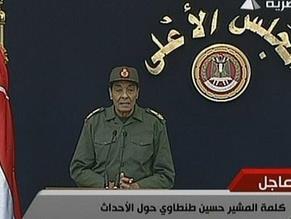|
World Jewish News

Egypt's Field Marshal Hussein Tantawi addressing the nation in a televised speech broadcast in Cairo on November 22, 2011. AFP PHOTO / EGYPTIAN TV
|
Egypt to hold presidential vote by July 2012, military chief says
23.11.2011, Israel and the World Egypt will hold presidential elections by the middle of 2012, the leader of the Egyptian military council, Field Marshal Mohamed Hussein Tantawi, said on Tuesday, in the wake of the regime's violent crackdowns on pro-democracy protests in Cairo's Tahrir Square.
Egypt's military ruler said the armed forces were also prepared to hold a referendum on immediately transferring power to a civilian authority if people demand it.
A reported 36 protesters were killed in clashes with Egyptian security forces since the latest wave of rallies took to the street this last Friday.
Speaking in a televised address on Egyptian television, the head of the Supreme Military Council of the Armed Forces claimed that the country's ruling military did not "want or aspire to stay in power."
Tantawi confirmed earlier reports, according to which the country's military council was willing to speed up the transfer of power to a democratically elected parliament and president, saying that parliamentary elections will be held as planned on November 28, with a presidential vote planned for the end of June 2012, at the latest.
Previously, the military rulers had floated late next year or early 2013 as the timetable for transferring power.
Tantawi also denied that security officials sought to harm Egyptian protesters in recent clashes, saying that the council's main objective was to retain order in the streets.
Tantawi's comments came after earlier Tuesday Egyptian political party leaders said that the head of the country's Supreme Council of the Armed Forces had agreed to move up the regime change to July 2012, while political parties have said the reins should be handed over on April 29.
Another demand made by parties at the meeting was for an independent investigation committee to look into the events of the last four days.
Abu al-alla Madi and Mohammed Selim el-Awa, two politicians who attended a five-hour crisis meeting with the military rulers, said Tuesday that the council also accepted the resignation of Prime Minister Essam Sharaf's government and will form a "national salvation" Cabinet to replace it.
The announcement was immediately rejected by tens of thousands of protesters in Cairo's Tahrir Square.
"We are not leaving, he leaves," they chanted, referring to military ruler Field Marshal Hussein Tantawi.
A senior Egyptian journalist told Haaretz that Tantawi’s resignation and failure to hand over the ruling powers will lead to total chaos, a result no one wants. “The pressure now is for the military council to agree to a set and close date for transferring power,” he said.
Tens of thousands were amassed in Cairo's Tahrir Square on Tuesday to demand the military set a date for presidential elections to enable the quick transfer of power to a civilian government.
The military has not yet said whether it accepted the resignation of Prime Minister Essam Sharaf's parliament, which was appointed by the council.
The four days of mass demonstrations have been accompanied by clashes between protesters and security forces, with at least 36 people killed and more than 1,250 wounded in the violence.
By Avi Issacharoff and Jack Khoury
Haaretz.com
|
|
